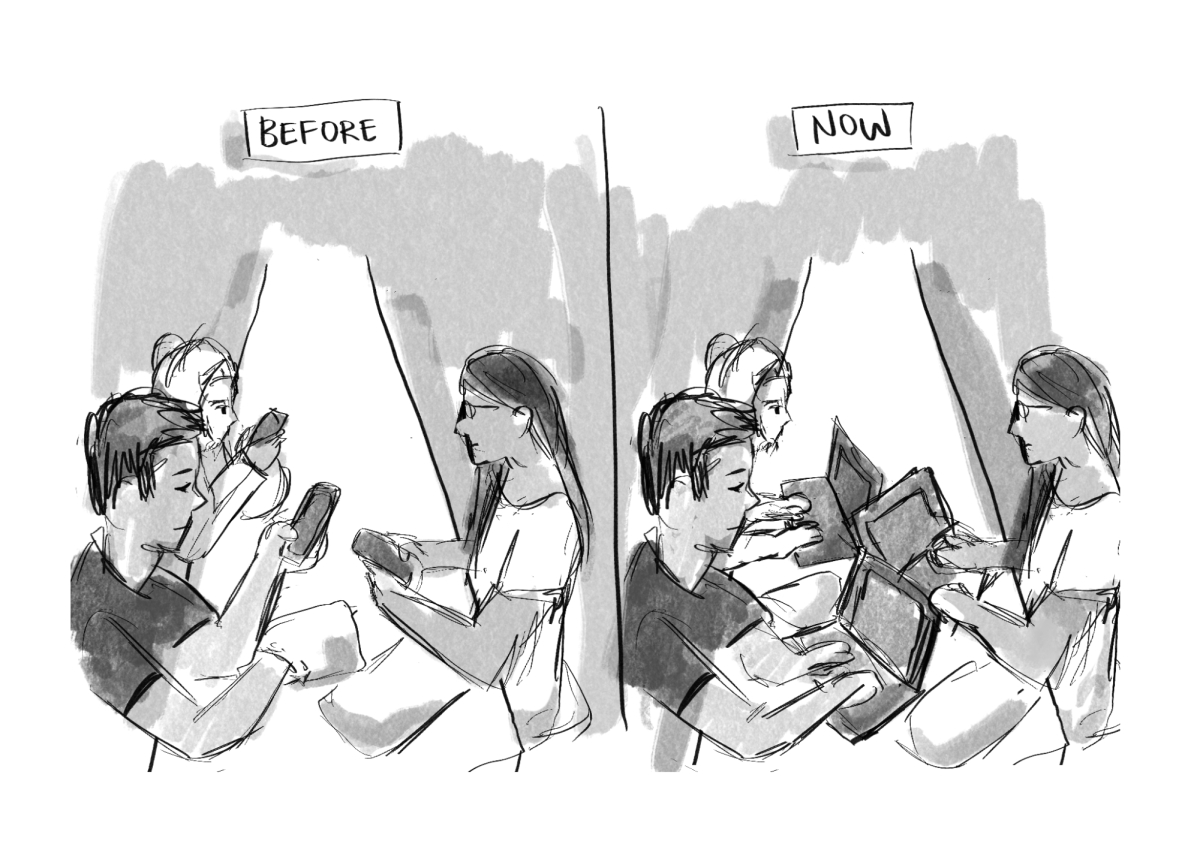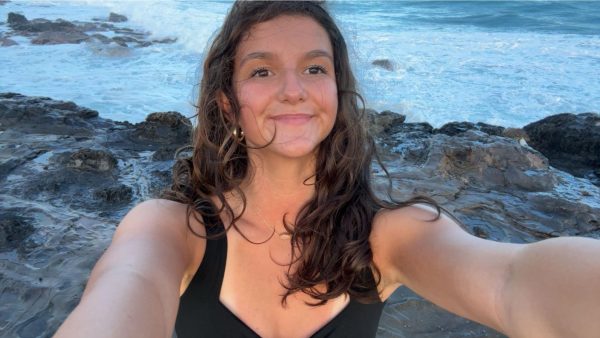Last year, phones were everywhere. On desks, hidden under tables, glued to hands during lunch. This year, they’ve all but disappeared. Lakeside’s new invisible device policy has transformed the campus. But is this change positive or negative, and how was it decided? To find out what really happened, Tatler conducted interviews with administrators, students, and teachers to gather their perspectives on the new technology-free campus.
According to Assistant Head of School and Upper School Director Ryan Boccuzzi, a phone-restriction policy has been on the minds of the Lakeside administration for over two years, as schools nationwide began to ban phones, including the Northshore School District in Washington.
As one of the leaders of the policy, Mr. Boccuzzi was initially hesitant to this restriction. Then, last spring, he spoke with colleagues at other schools in Seattle with a phone ban. According to them, it was going even better than expected. Students were interacting with each other and their schoolwork more than ever before. They were engaging more in clubs and inventing creative ways to socialize on campus. Colleagues saw kids diving into more playful activities, and they think “that’s in part because students aren’t afraid of being recorded or made fun of,” said Mr. Boccuzzi.
At the same time, Mr. Boccuzzi was considering overwhelmingly positive data reported by Lakeside students after not having their phones during outdoor trips and GSL.
According to Mr. Boccuzzi, Student Government decided to trial run a two-week phone restriction last year that banned phones in the WCC during lunch. The intention was to explore what a more relaxed policy would look like in practice and how accountable Lakeside students would hold themselves. Reflecting on this trial run, Mr. Boccuzzi notes, “there was some student interest in exploring this, but the way we executed it didn’t work.”
The administration was hoping that a self-regulating phone ban could be a success and align closer with Lakeside’s self-governed community guidelines. However, Student Government and Mr. Boccuzzi found that “without any sort of enforcement, this [wasn’t] going to work.”
With all this information in mind, faculty brainstormed alternative ways to enforce this policy during a professional development day this past summer. They were divided into groups and discussed various scenarios and versions of the phone policy, as well as many other hypothetical policy changes. Ms. Kaz, an English teacher, estimated that “the majority of teachers were in support of the change.” After a lot of back-and-forth on how to handle the situation, Lakeside settled on the invisible device policy currently in place.
The Phone Ban Rolls In
On August 26, one week before school started, Mr. Boccuzzi sent out an email announcing the Invisible Device Policy. For many students, the introduction of the policy was abrupt, a disorganized beginning to the 2025-2026 school year.
“I heard about other schools in Washington doing this,” mentions Kaliya W. ’27. “Still, receiving the email from Mr. Boccuzzi was completely unexpected.”
One pressing question that plagued the minds of many students involved the wording in Mr. Boccuzzi’s email.
He mentioned that he was “informed by anecdotal feedback from multiple student groups,” however, no student groups could recall being consulted before this policy was set in place.
When asked about this concern, Mr. Boccuzzi explains that he “could have been clearer” and hopes his “language was not misleading.” He clarified that what he meant “was in the spring, talking to Student Government about the WCC policy…conversations with [his] advisees, as well as hearing student accounts from GSL and outdoor trips.”
This raised another question: how significant was Student Government’s role in the trial run last year?
Student Government President Gresham C. ’26 mentioned overhearing that some members of the Student Government last year weren’t fully in accordance with the initiative, and did not initially support it. While interviewing students and Administrators, there was some contradiction between these two statements, ultimately leading to no definitive conclusion.
Teachers’ Opinions on the Phone Ban
Ms. Kaz, an English teacher who has been at Lakeside before the rise of the smartphone, has been overjoyed by the shifts she has already noticed at school. She fondly recalls a class from her past, where students would create class pranks and make music on their desks together. She explains that sort of community “came because they were more comfortable engaging with one another, and nowadays phones affect these social abilities.”
“I’m making eye contact with people,” she describes walking around campus. “It feels real.” She said that, in her English classes this year, people interact with each other as opposed to scrolling on their phones during five-minute breaks. When Ms. Kaz was asked about those uncomfortable situations, she chuckled, mentioning that those awkward moments “are classic high school and good situations to learn how to deal with.”
Ms. Asaka, the Director of Student and Family Support, expressed her concern for how social media was affecting the younger generation’s mental health. She explained that it is “hard for people in my age group to wrap their heads around [social media] because we didn’t grow up with this.”
However, despite her pressing concerns, Ms. Asaka is very hesitant to support the invisible device policy. She believes that Lakeside shouldn’t be introducing anything new, especially when many other rules have yet to be enforced.
“Our community has failed in other areas,” she said, “and we need to get better at those things before we add on yet another thing to try to improve on.” She continues, describing how “the WCC and the Student Center are regularly an absolute disaster. People literally leave their trash and their food, and they just get up and walk away. They do not clean up. Who’s enforcing that?”
Students’ feelings about the policy
Mekai H. ’27 said the policy was “a solution for a nonexistent problem” and overall “doesn’t think [school] is really any worse or better without them.” However, he does note, “I feel like it has helped me to be more socially confident because I don’t have a phone to turn to.”
Grace L. ’28 said, “There’s still a lot of confusion about the smartwatch ban — some teachers say only Apple Watches are banned, some say it’s okay as long as it’s off, and others say smartwatches of any kind are banned.”
She wishes that there was more clarity, emphasizing how “the smartwatch ban personally feels like a bigger change compared to the phone ban” as she’s been wearing an Apple Watch for years, and she “can’t really imagine switching to an analog one anytime soon. There [are] also alarming[ly] few clocks in the hallways … which is especially not great considering the new tardy policies.”
Additionally, despite Gresham’s position as president being a liaison between students and the administration, he was not notified of this new policy before the rest of the school. Although new to this leadership position, he wishes he had been informed or consulted. “I understand where [the administration is] coming from. So even if I disagree with the rule, I don’t hate that they’re imposing it.”
However, he noticed how this year seemed to be much stricter in comparison to the rest of his time at Lakeside, frustratedly pointing out “that they put this rule in conjunction with other rules that made campus life a lot stricter, such as the assembly seating, and tardiness now.”
The Motive Behind Lakeside’s Policies
This led to a new question: Is Lakeside becoming progressively more strict? Mr. Boccuzzi understood how this policy might come across that way. “One of my favorite things about this school is that we have expectations rather than rules,” he points out, also saying that “no doubt this feels more like a rule than an expectation.”
Alongside the rest of the administration, he trusts the students to put their phones away, rather than resorting to alternative options like having them turned in every morning. That is not to say he thinks everyone is phone-free from 8:10 to 3:10. He says, “I am not sitting here assuming that zero people are looking at their phone all day long. I’m not naive about that.”
The ultimate goal, he explains, isn’t to isolate or control students, but rather to simply increase student interaction.
In a discussion with Dr. Bynum, he emphasized the importance of the new policy while also acknowledging the mixed opinions of students. “Personally, if I were a 17-year-old, I would be pissed,” he chuckled. Still, he mentioned being in full support of the policy, noting that he has already “seen more heads up looking and connecting…a kind of old-school engagement on campus, if you will.”
Regarding future possibilities for the invisible device policy, he “[hopes] that we settle into a place of student trust and agency.” Dr. Bynum envisions a space where “[Lakeside] realize the values and the intentionality that is intended by this policy, but we also center trust and agency.”
It is apparent that Dr. Bynum believes Lakeside’s inherent mission should be to raise student voices; does the invisible device policy reflect that? How might increased student agency in decisions improve our policies? It is clear that this policy isn’t going away anytime soon; however, that doesn’t mean its guidelines and details are set in stone. While many students appreciate the policy, mixed opinions, questions, and concerns are far from meager. Only a month into the school year, this immense transition is still new and fresh. Whether the shift ultimately strengthens our community is yet to be seen.



